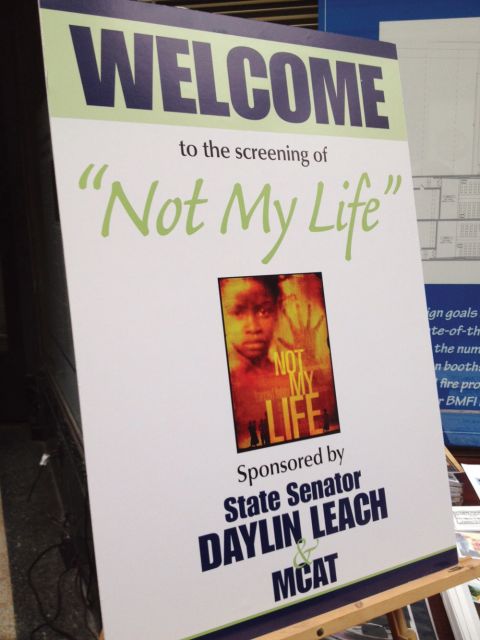
Two young women were trafficked from Allentown to New Jersey, according to Pamela J. Pillsbury, co-director of the Pennsylvania Regional Center for Public Safety Innovation. The documentary “Not My Life” was shown to a packed theater at the Bryn Mawr Film Institute on Saturday, Feb. 4, to spread awareness of human trafficking dangers and provide instruction on how to help victims.
“It’s happening everywhere,” Pillsbury said, following the film screening, emphasizing to the audience that the problem of human trafficking is very local. The film and panel discussion event were sponsored by Senator Daylin Leach (Pa) and the Montgomery County Anti-Human Trafficking Coalition.
During the film screening, audience members could be heard gasping at the terrible conditions in which trafficked and enslaved children were put through. According to the film “Not My Life,” young African boys worked in physically demanding conditions in a lake in Africa. This was only the beginning of what the audience at BMFI would learn from the film, which was narrated by actress Glenn Close.
The panel, led by Leach, also included Pearl Kim, special victims prosecutor for Delaware County. Kim was the prosecutor for the first human trafficking case within the state of Pennsylvania.
“That conviction involved a juvenile that was found on backpage. We got a tip from a community organization,” Kim said. “From there, we investigated and successfully prosecuted two of the three defendants under the trafficking of persons charged.”
In response to Leach’s question about the difficulty of proving trafficking cases, Kim also discussed common problems that come up.
“The issue that we’ve continuously run into regarding prosecutions is the fact that a lot of these victims do not self-identify as victims of trafficking,” Kim said. “In the current state law, you have to prove force, fraud or coercion.”
Also on the panel was Hugh Organ, associate executive director of Covenant House Pennsylvania.
“One of the victims I worked with some years ago at this point actually lived four blocks from here, and was being trafficked out of an apartment on Haverford Avenue, within walking distance of this theater,” Organ said.
“Not My Life” (2006) not only featured victims of the sex slave industry, but also children forced into battle. One of the film’s interviewees who survived life as a child soldier was a woman named Grace. Her story of survival is one that shows what can happen as more people are made aware of human injustices. An organization called Invisible Children works to raise awareness for child soldiers so that their lives can be saved.
James Dold, policy council for the Polaris Project, discussed how to recognize a potential trafficking victim.
“When we see a lot of victims, they’re not going to have things like identification,” Dold said. “Sometimes they’ll look disheveled, certainly signs of physical abuse would be present.” Advising the audience, Dold said that it’s important to call the national hotline or get in touch with Pearl if they notice someone who is or appears underage.
Pillsbury said that Look Beneath the Surface provides free information, such as simple questions people can ask someone believed to be a trafficking victim. This information can be found on the U.S. Department of Health and Human Services – Administration for Children and Families website.
The impact of seeing harsh conditions within modern-day slavery for work, sex and battles was evident among audience members. Several people voiced their questions and concerns to Leach and the experts on the panel.
One man in the audience said of the anti-trafficking organizations that they deserve our support, “especially Covenant House.” A woman in the audience asked “if anything is being done to educate law enforcement officers regarding victims.” Her concern focused on how women picked up for prostitution are treated as guilty instead of trafficking victims.
“Montgomery County is actually hosting training for law enforcement in March,” Kim said. Kim said that there would also be a week-long training program for prosecutors regarding the matter of seeing prostitutes as victimized by sex traffickers.
“People who hear about this can no longer turn a blind eye,” Pillsbury said.
Those interested in helping to get the Anti-Trafficking Bill No. 338 passed can call Dominic Pileggi’s office at 717-787-4712. Join Montgomery County Anti-Human Trafficking Coalition on their Facebook page to support their efforts.


